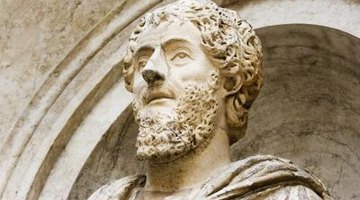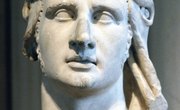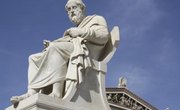Socrates, Plato and Aristotle are the three best-known Greek philosophers of antiquity, representing the classical era of Greek philosophy. In succession, Socrates taught Plato, and Plato taught Aristotle. Each man formulated his own rhetorical argument style and hypotheses about the nature of knowledge to influence the next generation of thinking people. These incredibly important philosophers formed the backbone of higher education for hundreds of years, and their influences continue to this day in the field of philosophy.
Iconoclastic
Although each man held his master and teacher in great reverence and awe, each of these three men were unafraid to challenge, reject and refute the assumptions of their predecessors. Aristotle directly attacked Plato's idea of ideal forms, as well as the repressive, elitist form of government depicted in "The Republic." Socrates' unique career began as a response to the stifling philosophical school of the Sophists.
Rigorous Inquiry
Ending with Aristotle, all three of these philosophers employed rhetoric to shape their language into symbolic forms that would become the logic of argumentation. This chain of rhetoric has a legacy that is the beginning of the scientific method, which began during the Islamic Golden Age and has its roots in the preserved knowledge from Greek and Roman antiquity.
Idealistic
Whether through Socrates' lust for discovering truth, Plato's ideal forms or Aristotle's logic, there is a common strain of idealism that makes these philosophers original. In those years, philosophical thinking showed the potential for artistic, scientific and political endeavors that could be more complex and intricate due to the striving of ideals promoted by philosophy.
Enshrined by History
The disparate yet reactionary nature of each of these thinkers distinguishes them and causes them to be accepted as a continuum of philosophical schools of thought. Their rhetorical soundness and their implicit encouragement of original thought, which Plato originally set out to do when rejecting sophistry, heightened their importance.
Related Articles
References
Writer Bio
Based in the New York City Metro area, James Woudon began writing in 1999. He is a former editor of the college publication, "John Doe Comics." Woudon holds a Bachelor of Arts in communications from Rutgers University.











